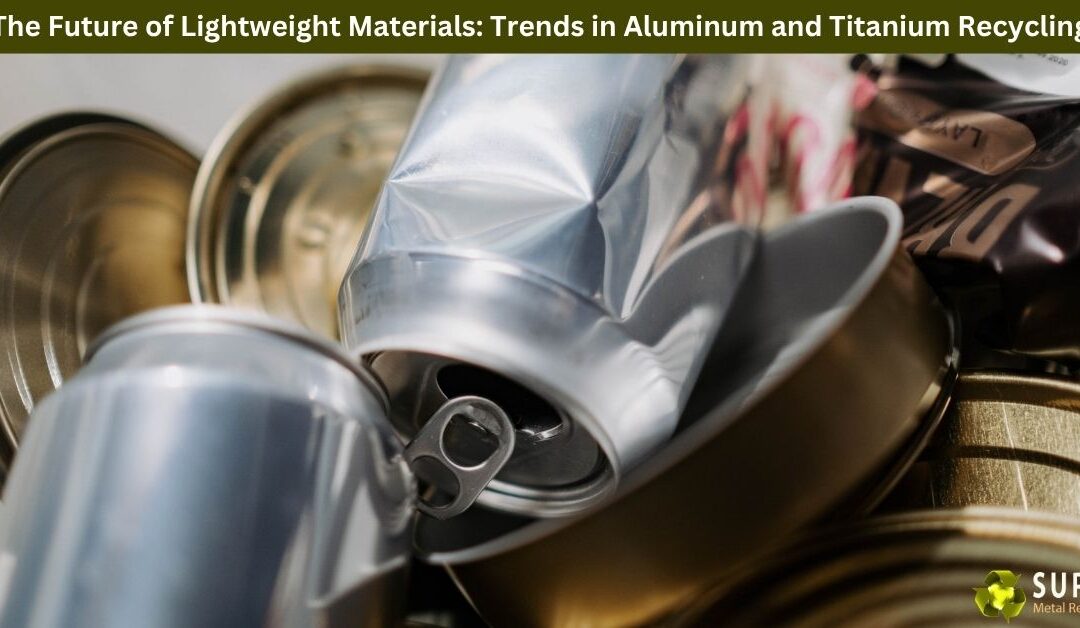Lightweight metals like aluminum and titanium have become the unsung heroes of modern engineering. You’ll find them in everything from aircrafts to smartphones, electric vehicles to soda cans. Why? Because they’re strong, durable, and—most importantly for our planet—recyclable. But as demand skyrockets across industries, how we recycle these metals is evolving fast. Let’s take a closer look at what’s changing in the world of aluminum and titanium recycling and why it matters more than ever.
Why Aluminum and Titanium Are So Valuable
Aluminum and titanium aren’t just shiny and strong—they’re game changers.
Aluminum is lightweight, corrosion-resistant, and incredibly easy to recycle. In fact, around 75% of all aluminum ever produced is still in use today. It melts at a relatively low temperature compared to other metals, which means recycling it uses 95% less energy than producing new aluminum from raw ore. That’s a huge win for both the environment and manufacturers.
Titanium, on the other hand, is a bit trickier. It’s super strong, heat-resistant, and commonly used in aerospace, medical implants, and high-performance sports gear. But recycling it isn’t as simple as tossing it into a furnace. The process is more complex, yet the demand is pushing the industry to innovate faster than ever.
The Green Push: Why Recycling is More Important Than Ever
Let’s face it—climate change and resource scarcity aren’t going anywhere. Governments and industries around the world are turning to circular economy practices, where waste is minimized and materials are reused as much as possible.
Aluminum and titanium are right at the center of this shift.
Take the automotive industry, for example. Electric vehicle (EV) manufacturers are racing to make lighter cars to extend battery range. Aluminum is already widely used, but as recycling tech improves, we’re seeing more secondary aluminum—recycled aluminum—make its way into EV frames and body parts. It’s cheaper, greener, and just as effective.
In aerospace, titanium is essential. And while it’s expensive to recycle, new processes like plasma arc melting and electron beam melting are making it more viable. These aren’t just buzzwords—companies like Boeing and Airbus are investing heavily in recycled titanium to reduce costs and improve sustainability. It’s no longer just a nice-to-have—it’s becoming essential to stay competitive.
What’s New in Aluminum Recycling?
You’d be surprised how much innovation can happen with a metal we’ve been using for over a century.
- AI-Powered Sorting: Scrap yards are now using advanced sensors and artificial intelligence to sort aluminum from mixed waste more accurately. This boosts efficiency and helps ensure clean, high-quality recycled material.
- Closed-Loop Recycling: Some manufacturers are now designing products specifically for recycling. Think beverage cans that are returned, melted down, and turned into new cans within 60 days. Companies like Novelis and Hydro are leading this charge.
- Alloy Separation: One of the challenges with aluminum recycling has been separating different aluminum alloys. New technologies are now allowing us to sort alloys more effectively, opening up more high-grade applications for recycled aluminum.
The Challenge—and Promise—of Titanium Recycling
Titanium recycling has always been a bit of a tough nut to crack.
Because it’s used in high-spec applications—like jet engines or surgical implants—scrap must meet very strict purity standards. But recent breakthroughs are making things easier:
- Pre-Consumer vs Post-Consumer Scrap: Most recycled titanium has traditionally come from leftover materials during manufacturing (pre-consumer scrap). But now, researchers are working on ways to better collect and refine titanium from end-of-life products (post-consumer scrap), which could significantly expand the supply.
- Recycling by Additive Manufacturing: Titanium powders used in 3D printing are often recyclable and reusable. This is creating a mini circular economy within the aerospace and medical industries, where titanium parts are printed, used, and then re-melted and printed again.
One example? Metalysis, a UK-based company, has developed a solid-state process that reduces titanium dioxide into powder with minimal energy. Not only is it more eco-friendly—it could slash the cost of titanium recycling in the future.
Local Perspective: What It Means for Metal Recycling Companies
As a metal recycling service, staying ahead of these trends isn’t just good business—it’s essential.
For aluminum, it means investing in better sorting equipment and building relationships with industries looking for clean, recycled feedstock. For titanium, it might mean partnering with aerospace firms or investing in technologies that can handle high-purity metals.
And for customers? It means knowing that your scrap isn’t just waste—it’s part of something bigger. That old aluminum ladder or discarded bike frame might just end up in the next generation of EVs.
Not Just Scrap—It’s the Future
At the end of the day, recycling aluminum and titanium isn’t just about keeping landfills empty. It’s about feeding the industries that are shaping tomorrow—cleaner transportation, smarter technology, and greener infrastructure.
Whether you’re a manufacturer, a fabricator, or someone cleaning out your garage, these materials have value far beyond the scrap yard. And as recycling technology continues to advance, their value is only going to grow.
Worth Remembering
The next time you see a pile of metal offcuts or hold an empty aluminum can, think bigger. These aren’t just cast-offs—they’re raw materials for the future. The aluminum from today’s packaging might power tomorrow’s EV. That titanium from an old aircraft part could be reused in a life-saving medical implant.
In a world trying to do more with less, recycling lightweight metals isn’t just smart—it’s absolutely vital.
If you are in Eumemmerring, and looking for a metal recycling service, this is the best way to visit us.
Super Metal Recycling
345 Frankston – Dandenong Road, Dandenong South VIC 3175
(03) 9706 4909


Recent Comments